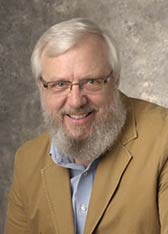
| ||||||||
| Speaker Tells Abortion-Rights Opponents Not to Give up | |||||||
|
WASHINGTON – While ardent opponents of abortion rights filled subways and streets for the March for Life rally on the 34th anniversary of Roe v. Wade, a small group of United Methodists quietly worshiped together, renewing a call to change the church's position on abortion as a choice under certain circumstances. But the group acknowledged that revising the church's stance on abortion, as outlined in the Book of Discipline, is not an active battle within the denomination. "This is not a front-burner issue in The United Methodist Church, and it is unlikely to become one," said the Rev. William J. Abraham, a professor at United Methodist-related Perkins School of Theology in Dallas. "What is important is that (anti-abortion) groups keep their nerve and don't get weary in lifting the issue up." The United Methodist Church, in its Social Principles, officially recognizes and respects the sanctity of unborn human life and the sacredness of the life of the mother, but is open to abortion when an "unacceptable" pregnancy may cause "devastating damage" to the mother. The denomination opposes late-term or partial-birth abortions and does not affirm abortion as a means of birth control. The worship service was held Jan. 22 in the chapel of the United Methodist Building, across the street from the U.S. Capitol. It was the 19th annual service sponsored by the Taskforce on Abortion and Sexuality, an unofficial network of United Methodist clergy and laity that opposes abortion and publishes a newsletter called Lifewatch. Using Hebrews 12:14 as his sermon text, Abraham encouraged debate over abortion while "living at peace with all." Abraham said abortion-rights opponents must hold fast to their belief that "the moral core of the debate about abortion hinges on the destruction of human life. Casting the debate as a debate about choice is a strategy of evasion and deceit." Representatives of the United Methodist Board of Church and Society, which works to promote the Social Principles and engage in Christian social concerns, say abortion is a gray issue that can polarize Christians when it is presented as a black-and-white issue. "There's no real consensus in the medical community, and even the field of theology, as to when life begins, and that is part of the tension of this issue," said Linda Bales, a board staff executive who oversees issues of reproductive health, family planning and abortion. "As a board, we're trying to move away from the polarization and the labels and focus our energies on family planning and comprehensive sex education and ways to prevent girls and women from finding themselves in this position in the first place," said Bales, who attended the pro-life service along with other representatives of the board. Abraham urged his listeners to use "wit and wisdom" to confront opponents in a way that is effective in today's society, and also to ally themselves with other denominations and faiths, including Catholics, Baptists, Pentecostals, Jews and Muslims. He cited the "bursting of Islam" in the West as a "momentous development. Islam has put itself in the pole position in the race to think afresh about the legitimacy and nature of democracy in the future. Religion is back in the public square." One worshiper said a renewed debate about abortion has yet to resonate at the local church level. "Our church is too silent on the issue," said Dawn Ginter, a member of First United Methodist Church in Port St. Lucie, Fla. "The church is not discussing it in the pews." Lifewatch is offering three resolutions at the annual and General Conference levels to promote debate and to change language in the Book of Discipline. One would revise the paragraph on abortion in the Social Principles. The others call for the church to withdraw from the Religious Coalition for Reproductive Choice, an ecumenical group working to keep a woman's legal right to abortion under the Supreme Court's Roe v. Wade decision in 1973. Proponents of the resolutions say the winds of change are blowing. "Our church tends to shift with the culture. American culture is becoming more pro-life by the year," said the Rev. Paul Stallsworth, pastor at St. Peter's United Methodist Church in Morehead City, N.C., and editor of Lifewatch. |
| ||||||
 |
Last
Updated January 27, 2007



